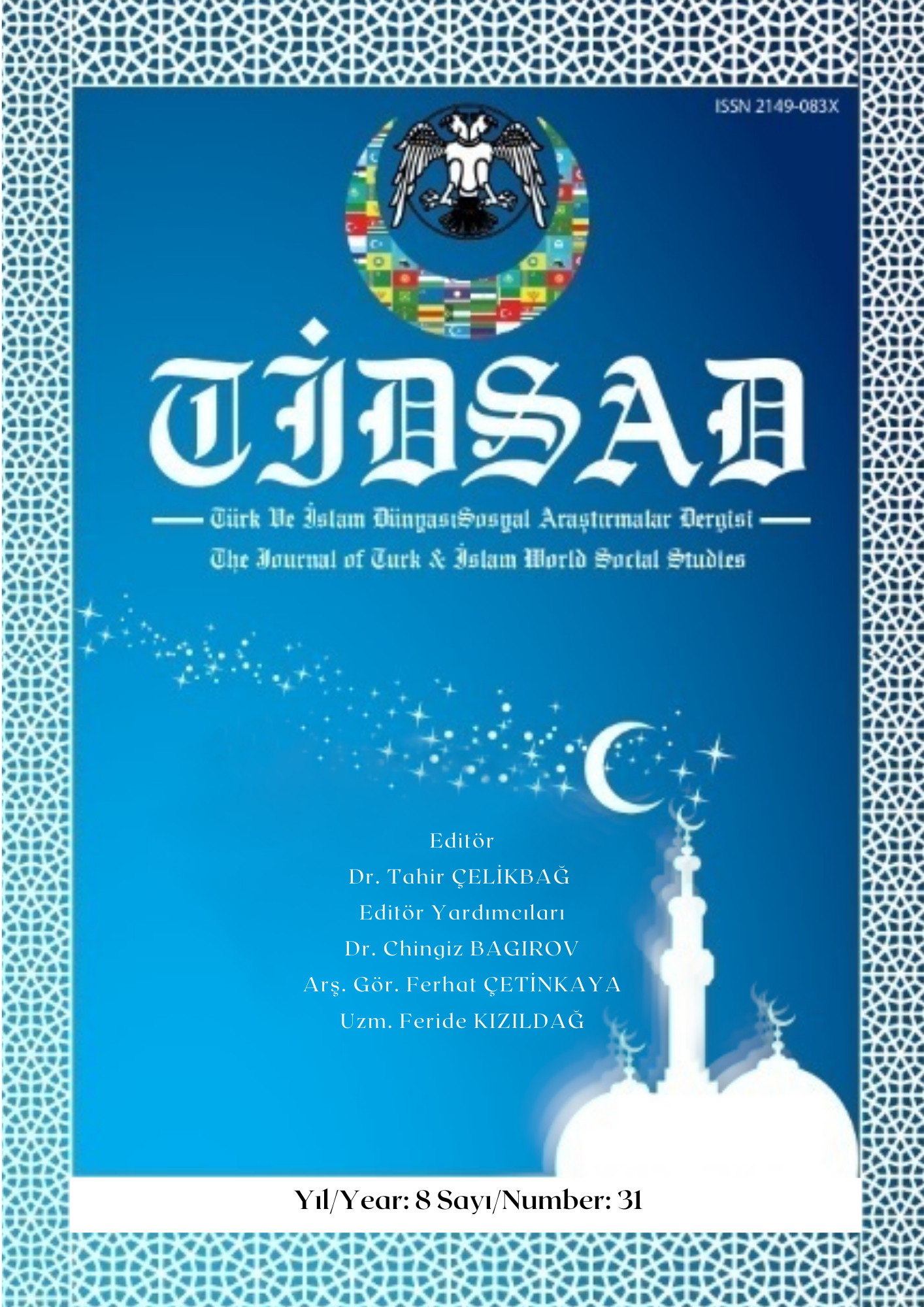Author :
Abstract
Metodolojik anlamda kavramsal ve kaynak taramasından beslenen bu tarihsel sosyoloji çalışmasında; 1402 tarihinde Ankara’nın Çubuk ovasında Emir Timur ile Osmanlı Sultanı I. Beyazıt arasında vuku bulan savaş ele alınmıştır. Olayın tarihte ne kadar önemli bir dönüm noktası olduğu, sonradan belirecek yakın ve uzak sonuçlarının ışığında iyice anlaşılmıştır. Batılı tarihçiler dahi olaya ilgi beslerler. Bu savaşta, ziyadesiyle mağrur ve gururlu olduğu bilinen padişah Beyazıt rakibine esir düşüp esarette üzüntüden vefat etmiştir. {Zayıf bir söylentiye göre yüzük taşındaki siyanür tuzuyla intihar (özkıyım) yolunu seçmiştir}.Balkanlar’daki başarıların yanında Anadolu beyliklerinin ezici çoğunluğunu da kendisine bağlamış iken; birden gelişen bu yeni durum karşısında, Osmanlı açısından, olanca emekler suya düşmüştür! Beylikler tekrar bağımsız olmuşlar, şehzadeleri ise birbirlerine düşmüşlerdir. Kardeşlerden Çelebi Mehmed’in galip gelip devleti tekrardan çekip çevirmesine kadar on yıl zaman kaybedilmiştir. Bir yandan da; tomurcuklanma evresindeki merkezî yapılanmaya kafa tutmak; âdetâ özendirici hâle gelmiştir. Şeyh Bedreddin isyanı bile ilgili kargaşanın bir uzantısı olarak değerlendirilebilir; zira o, kardeş Musa Çelebi’nin kazaskeriydi. Çelebi Mehmed’in ardılı II. Murad dahi, döneminin başlarında iki ayrı şehzâde Mustafa ile uğraşmak gâilesi yaşamıştır.
Keywords
Abstract
In this study of historical sociology, which is of conceptual nature based on literature survey; the battle between Tamerlane and the Ottoman ruler Bayezid the Thunderbolt which revolved in Çubuk-plain in the proximity of Ankara in 1402; is taken into consideration. The immediate and later consequences of the battle verify its significance as an important turning point in history. Even occidental history-writers are concerned about this happening. In this battle, Sultan Bayezid, who had been known as an extremely arrogant and proud personality; ended up as a war in the hands of his rival and eventually died of grief, during his captivity (A weak hearsay would claim his suicide by swallowing the cyanide salt concealed under his ring-stone). Having gained immense success in the Balkans while subduing the crushing majority of the Anatolian principalities already; with the sudden emergence of this new development; the entire previous efforts of the Ottomans proved to be futile. The Anatolian principalities regained independence while the late sultan’s sons (princes) took arms against one another. An entire decade got lost until one of the brothers, Çelebi Mehmed, took the upper hand over his rival-brothers, pulling the state together. On the other hand, menacing the burgeoning central government almost became a “rule of thumb” worth of emulation. The revolt of Sheikh Bedreddin may be taken as an extension of the involved chaotic situation, as well; since he used to be the highest religious clergy of brother-Musa. Even Çelebi Mehmed’s successor Murad the Second experienced the problem of confrontation with two different Prince-Mustafas, in the beginning of his reign.
Keywords
- Aksun, Z. N. (1994). Osmanlı Tarihi: Osmanlı Devleti’nin Tahlilli, Tenkidli, Siyasî Tarihi (Birinci Cilt). İstanbul: Ötüken Neşriyat.
- Armağan, M. vd. (Haz.). (1996). Osmanlı Ansiklopedisi: Tarih-Medeniyet-Kültür (Cilt I). İstanbul: İz Yayıncılık.
- Arvas, A. (2019). The Place of Tamerlane in Nasreddin Hodja’s Jokes. Çankırı Karatekin Üniversitesi Edebiyat Fakültesi Dergisi, 7(2), 167-180.
- Bahadıroğlu, Y. (2007). Resimli Osmanlı Tarihi. İstanbul: Nesil Yayınları.
- Barber, N. (1973). Lords of the Golden Horn:The Sultas, Their Harems and the Fall of the Ottoman Empire. London: Macmillan.
- Bardakçı, M. (09. 10. 2005). “Saray soytarısı geleneğimizi Batılılaşma merakımız bitirdi”. Hürriyet Gazetesi-Kelebek Eki.
- Belli, V. F. (1981). Basılmamış Genel Psikiyatri ve Adlî Psikiyatri sabah sohbet seansları. Çukurova Tıp Fakültesi Adlî Tıp Kürsüsü, Balcalı-Adana.
- Cezar, M. (2010). Resimli-Haritalı Mufassal Osmanlı Tarihi (Birinci Cilt). Ankara: Türk Tarih Kurumu.
- Efe, A. (2007). Çocuklar ve Gençler İçin Osmanlı Tarihi Ansiklopedisi (8. Baskı). Ankara: Akçağ Yayınları.
- Feran, Z. (1966). L’Organisation de la Croisade de Nicopolis et Yıldırım Bayezıd [Niğbolu’ya Karşı Haçlı Seferi ve Yıldırım Beyazıt]. İstanbul: Civan Matbaası.
- Günay, Ü. (2003). XV. Yüzyıl Osmanlı Toplumunda Sosyo-kültürel Yapı, Din ve Değşme. Erciyes Üniversitesi Sosyal Bilimler Enstitüsü Dergisi, 14, 21-28.
- Güney, E. (14 Mart 2021). “Timur'la Bayezid'in Ankara Savaşı'nı nasıl bilirdiniz?”. T24 Bağımsız İnternet Gazetesi.
- Güzel, H. C. ve Birinci, A. (Haz.) (2002). Genel Türk Tarihi (Beşinci Cilt). Ankara: Yeni Türkiye Yayınları.
- Güzel, H. C., Çiçek, K. ve Koca, S. (Haz.). (2002). Türkler (On Birinci Cilt). Ankara: Yeni
- Kamadan, Y. S. (11 Ekim 2021). “İbn Haldun’un Emir Timur’le Sohbeti”. Mecra [dijital Blog].
- Kaymaz, N. (1964). Anadolu Selçuklu Devletinin İnhitatinda İdare Makanizmasinin Rolü. Tarih Araştırmaları Dergisi (TAD), 2(2), 91-155.
- Kılıçoğlu, S., Araz, N. ve Devrim, H. (Haz.). (1960, 1990). “Şarabdar”. Meydan Larousse: Büyük Lûgat ve Ansiklopedi (Cilt 11). İstanbul: Meydan Yayınevi.
- Maksudoğlu, M. (2001). Kuruluşunun 700. Yılında Osmanlı’nın Tarihi 1299-1922 (Ikinci Baskı). İstanbul: Boğaziçi Yayın.
- Öztuna, Y. (1970). Resimlerle Türkiye Tarihi. İstanbul: Hayat Yayınları.
- Roux, J. P. (2000). Histoire des Turcs: Deux mille ans du Pacifique { la Méditerranée, Fayard, Paris.
- Vatin, N. (1996). La mort des sultans Ottomans. in Veinstein Gilles (Ed.): Les Ottomans et la mort, E.J. Brill parutions, Leidne & New York & Köln.





